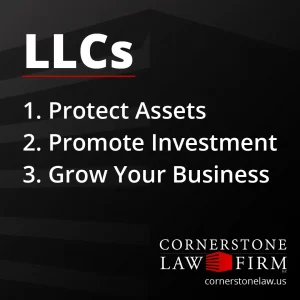6 Benefits to Limited Liability Companies
What is an LLC, and why should you get one? LLCs are a powerful and flexible corporate form that provide incredible opportunities and protection for business owners. Even if you’re a small business, an LLC can provide a platform to grow and protect your business—and if you’re large, it’s definitely time to look at the benefits an LLC can provide.

1. LLCs Shield You from Liability
![]() LLC stands for Limited Liability Company. When you form an LLC, you’re forming a company that limits your liability. LLCs are a “shield” that limit your legal liability for business decisions and mistakes that might otherwise harm you or your family.
LLC stands for Limited Liability Company. When you form an LLC, you’re forming a company that limits your liability. LLCs are a “shield” that limit your legal liability for business decisions and mistakes that might otherwise harm you or your family.
For example, let’s say your business is installing hot water heaters. You sign a contract to install a hot water heater in a large office building, and you install the heater, but unfortunately, you are having a bad day, and you make a mistake, and the heater bursts and causes flooding in the basement of this office, or it causes someone to get burned, or maybe it just doesn’t work, and the business loses money because they don’t have hot water for a few days.
So what happens? You get sued—you do, personally—because you messed up. You breached a contract, your negligence caused an injury, your product that you re-sell subjects you to strict products liability, or all of the above. When this business and the injured employee and the office building’s owner or property management company sue you, they’re suing you, personally. If they win, they can collect that judgment by putting a lien on your house, by attaching your bank account, etc.
Now how would an LLC have helped you here? Simply put, if you run a company and make your contracts in the company’s name, then your breach of contract and other issues result in a suit against the company. That means your personal assets are not at risk. You aren’t personally being sued, you don’t personally have to report lawsuits against you personally if you’re seeking a mortgage, you can sleep a little better at night. It doesn’t mean your business won’t suffer from the lawsuit, it just means there’s a sealed wall between you and your company. Your company, in other words, limits your liability.
It’s important to note this doesn’t mean you can’t ever be sued personally for your actions, but if you set up your LLC properly, you will eliminate most of the situations in which you can be personally sued.
2. LLCs Allow Complex Forms of Ownership
![]() If you’re a small business with a single owner, you can skip this one, but for family-owned businesses or startups with your college buddies that have quickly become lop-sided, an LLC allows you to setup virtually any ownership structure that you can dream of.
If you’re a small business with a single owner, you can skip this one, but for family-owned businesses or startups with your college buddies that have quickly become lop-sided, an LLC allows you to setup virtually any ownership structure that you can dream of.
Does one person handle one aspect of the business? Does someone do most of the day-to-day management, while others contributions are physical assets or money? Such “lopsided” investments can be difficult to manage without an LLC as everyone’s contribution should be valued, but not everyone needs their “hands in the stew” of day-to-day management. Setting up your LLC with a board of directors or a day-to-day manager but giving financial ownership to those who’ve invested allows you to solicit investment without giving away power.
Similarly, using LLCs to shield risky investments from assets allows a business to grow in a more stable fashion. One example is setting up an LLC to protect real estate investments from one another. Using an LLC to purchase property, and setting up separate LLCs for each property allows a real estate business to protect one piece of property from the dangers that might come from another. If an injury occurs on one property, there is no liability attaching to a property owned by another LLC under the same company.
3. LLCs allow Outside Investment
![]() Do you want to take on angel investors, or sell stock? The terminology is different (stock refers to a corporation’s ownership structure), but the function is the same. By offering investors a different class of “membership” (ownership), you can sell financial stake in your company without giving up control to the investors.
Do you want to take on angel investors, or sell stock? The terminology is different (stock refers to a corporation’s ownership structure), but the function is the same. By offering investors a different class of “membership” (ownership), you can sell financial stake in your company without giving up control to the investors.
4. LLCs can be sold
![]() Do you foresee the possibility that you might want to sell your business down the road? Your business may be satisfying now, but in thirty years, will you want to consider a second career? Would you like to be bought out for a huge amount of money in a few years by a company that thinks they can do something huge with your startup? Setting up an LLC makes it much easier to sell your business to someone who wants to take over your client list and assets one day.
Do you foresee the possibility that you might want to sell your business down the road? Your business may be satisfying now, but in thirty years, will you want to consider a second career? Would you like to be bought out for a huge amount of money in a few years by a company that thinks they can do something huge with your startup? Setting up an LLC makes it much easier to sell your business to someone who wants to take over your client list and assets one day.
Technically, you can always sell your business, even without an LLC. But many lawyers will advise a potential buyer to look elsewhere if your business is not well organized. Having an LLC that is properly setup and running encourages a potential buyer that their purchase will be easy to roll over into a new or existing business.
5. LLCs Let you Take Risks and Go Bankrupt
![]() I realize this sounds a little wild, but have you ever wanted to try a risky business? Have you ever wanted to take a leap? As discussed in number one, above, forming an LLC allows you to protect your personal assets. If your business goes belly-up, you aren’t putting your house at risk, or your personal credit.
I realize this sounds a little wild, but have you ever wanted to try a risky business? Have you ever wanted to take a leap? As discussed in number one, above, forming an LLC allows you to protect your personal assets. If your business goes belly-up, you aren’t putting your house at risk, or your personal credit.
Note, however, that this point is somewhat limited. Yes, the LLC will be liable for debts, but if you’re taking out enormous loans for a young LLC, you may be forced to co-sign. As always, it’s not just forming the LLC that matters—it’s how you manage and run it.
6. LLCs are the New Corporations
![]() What about corporations? Should you consider one of those instead of an LLC? In short, LLCs are a new corporate form that has replaced corporations. Many companies will continue to run as corporations—and there’s nothing wrong with that. But new businesses starting up today should use LLCs except in very limited circumstances (where you expect to be publicly traded, or where you want to be nonprofit). Even those exceptions may soon be reduced.
What about corporations? Should you consider one of those instead of an LLC? In short, LLCs are a new corporate form that has replaced corporations. Many companies will continue to run as corporations—and there’s nothing wrong with that. But new businesses starting up today should use LLCs except in very limited circumstances (where you expect to be publicly traded, or where you want to be nonprofit). Even those exceptions may soon be reduced.
So should you form an LLC?
Forming an LLC is almost never a bad idea, but the return on investment depends on the nature of your business and what your various risks are. Call the Cornerstone Law Firm, LLC today, and let’s talk about how we can help your business grow.



